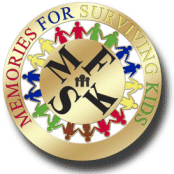
Presenting Letters
As a new widow(er) or guardian with children in your care, you are faced with many tough choices. We now add to that the consideration of the timing to share others’ memories of the deceased with the children. The first question that comesto mind might be – Are the children ready to hear those letters? But that is not the only question. It is equally important to wonder if you are ready.
The idea of readiness implies something that may not be correct. It suggests hat a function of time might be an element of making you – or any of the children – ready. The mythological idea that time heals all wounds crops up and moves us to the more realistic question – Have you or the children taken actions to complete the pain caused by the death, which is what would make you or them ready to read and hear the letters?
Would you take scuba diving lessons from someone who has never scuba dived?
As the tour guide for your children, you are the leader of the pack. It is your verbal and non-verbal behavior in reaction to the loss that will demonstrate to them how to deal with their emotions. Like you, they are now walking through life in radically altered circumstances. If you cover up your feelings and “act strong,” they will too. If you tell them that “time will heal” them rather than teach them actions to complete the pain in their hearts, they will believe you. After all, you are the adult, you are the teacher.
Before you consider reading those letters for yourself or to your children, we strongly suggest that you read When Children Grieve – For Adults to Help Children Deal with Death, Divorce, Pet Loss, Moving and Other Losses written by John W. James & Russell Friedman with Dr. Leslie Landon Matthews. The contents of the book will help you be prepared to guide your children as they respond emotionally to the letters.
Let us touch briefly on the different ages and developmental stages of children. As it relates to an understanding of death, children’s awareness and perception varies widely. Very young children, up to the age of about 7, rarely understand the permanence of death. Between ages 7 and about 12, youngsters have an awareness of the real meaning of death, but often as something remote that doesn’t affect them. Unless, however, someone important to them dies. From age 12 on up, young people can comprehend both the meaning of death and the impact it can have when someone important to them dies.
With that in mind, parents and guardians are well-advised to remember that it may not be advisable to mix their different aged children together for the reading of letters. The very young ones might not understand and become confused and scared by what they hear. Each adult guardian must establish the understanding level and maturity of each child.
The authors of When Children Grieve are also the principals of The Grief Recovery Institute Educational Foundation. They have prepared this list of suggestions to help you guide the children in your care.
When talking with your child about their parent who died:
* Adults—Go First. Telling the truth about your own grief will make your child feel safe in opening up about his or her own feelings.
* Listen with your heart and not your head. Allow all emotions to be expressed without judgment, criticism, or analysis.
* Recognize that grief is emotional, not intellectual. Avoid the trap of asking your child what is wrong. He or she will automatically say, “Nothing.”
* Be patient. Don’t force your child to talk.
* Remember that each of your children is unique and each has a unique relationship to the parent who died.
* Never say “Don’t feel sad” or “Don’t feel scared.” Sadness and fear, the two most common feelings attached to loss of any kind, are essential to being human.
In the time following the death, a great deal of what is beneficial for your children [and you] will happen in the spontaneous conversations you have over breakfast or dinner or in the car. The more you learn and practice the ideas presented above, the more you will create safety for the reading of the letters you have gathered.
Recent tips from Ed Owens at The Grief Recovery Method:
- Listen with your heart, not your head. Allow all emotions to be expressed, without judgment, criticism, or analysis.
- Recognize that grief is emotional, not intellectual. Avoid the trap of asking your child what is wrong, for he or she will automatically say, “Nothing.”
- Adults – Go first. Telling the truth about your own grief will make your child feel safe in opening up about his or her own feelings.
- Remember that every child is unique and each has a unique relationship to the loss event.
- Be patient. Don’t force your child to talk.Never Say “Don’t feel sad” or “Don’t feel scared.” Sadness and fear, the two most common feelings attached to loss of any kind, are essential to being human.
Planning the Letter Reading
You may want to plan a special event for reading the letters. While the formal funeral service and other memorial events may have happened some time ago, you can always create your own memorial service. Depending on the ages of the children and their inclination, they may want to help plan the event. Participating in the event helps reduce the emotional isolation.
Important chronicling dates like birthdays or holidays sometimes add an emotional stimulus to the letter reading. While there may be significant sadness, that is natural, and does not indicate that you should delay the reading. There is likely to be a great deal of feelings regardless of when the letters are read. It is most important that you understand that sad emotions, like happy ones, are not bad. They are actually helpful to all concerned.
Save the Letters
You will want to keep the letters in a safe place. As your children develop, they may want to review the letters from their maturing points of view.
